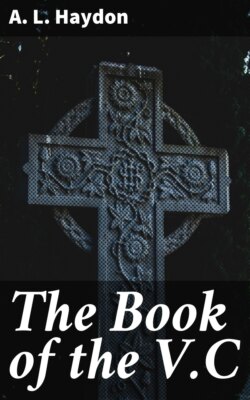Читать книгу The Book of the V.C - A. L. Haydon - Страница 7
На сайте Литреса книга снята с продажи.
CHAPTER III.
THE CRIMEA.—IN THE BALACLAVA CHARGES.
ОглавлениеTable of Contents
It is not remembered as it should be that there were two brilliant charges made at Balaclava, on that grey day of October 25th, 1854. Tennyson’s stirring lines in honour of the Charge of the Light Brigade have given enduring fame to the “noble Six Hundred,” but the exploit of the “Three Hundred,” the Heavy Brigade, should make the name of Balaclava equally thrilling to us.
The Heavy Brigade was composed of squadrons of the 4th and 5th Dragoon Guards, Scots Greys, Inniskilling Dragoons, and the 1st Royals, under the command of Brigadier-General Yorke Scarlett. At an early stage of the fight Scarlett was proceeding with his brigade to the support of the “thin red line” which was bearing the brunt of the Russian attack, when suddenly a huge mass of Russian cavalry, Cossacks and others, 3000 strong, loomed up on the heights to their left.
The situation was a perilous one, as the General saw in a glance. The launching of that great crowd of Russians upon the valley below meant annihilation for his little force. With a quick command to “wheel into line,” Scarlett gave orders for the brigade to form up, facing the enemy. By some blunder, however, the movement was not properly executed, and when the Russians flung out in a wide-spreading crescent to envelop the few hundreds of British redcoats below them, two squadrons of the Scots Greys with one of the 6th Inniskillings were left in front to receive the first shock of the attack.
With that menacing horde of grey-coated, black-bearded Russians, poised like a hawk about to swoop upon its prey, there was no time for pause. Shrill on the air the “Charge!” rang out, and with Scarlett leading them, the little advance body of “Heavies”—300 men of the Scots Greys and Inniskillings—dashed off to meet the foe.
We have no such details of the fight as were forthcoming after the Charge of the Light Brigade, but we know that it was a most desperate affair. For every one of that handful of men, flung into a mass of the enemy that outnumbered them many times over, it was a hand-to-hand struggle for life of the most heroic kind. For a few moments they were lost to sight. Then out of the heaving, surging multitude the black bearskins and brass helmets of the Scotsmen and Irishmen broke into view here and there, while their sabres flashed in the sun as they hewed their way through.
It was a battle of giants. What wonder that the Russians gave for a brief moment under the fierce onset?
